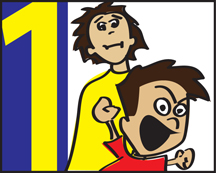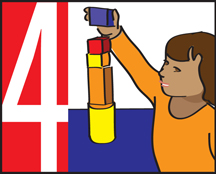
07 Oct Skills for Parenting Special Needs Children
by Dr. Michael Popkin
Founder and President, Active Parenting Publishers
For over 34 years, Active Parenting skills have proven effective with almost all children. However, those who have worked with special-needs children know that how these skills are applied and modified to fit their needs can make all the difference. Beginning with the development of Active Parenting 4th Ed., our programs address some of the specific implications that Active Parenting principles and skills have for parents faced with the challenges and opportunities of helping these children thrive.
By “special needs” I mean a physical or mental health condition that requires early intervention, specialized education, or other services and support-including “spirited” children like my own son. Children who face special challenges of their own also present special challenges for their parents and other caregivers. For example, they may find themselves asking: “How do I help my child without making her overly dependent on me?” “How do I discipline my child without making matters worse?” and “What does my child really need from me?”
We address these and other questions in both Active Parenting 4th Ed. and the new Active Parenting: First Five Years, though the advice to leaders and parents is applicable to children of all ages.
Here are six of my favorite points to keep in mind with this group:
 Click to download a colorful flyer with these tips to share with parents and caregivers!
Click to download a colorful flyer with these tips to share with parents and caregivers!
Special-Needs Children are best served when parents and other caregivers:
 Avoid overcompensating by becoming permissive.
Avoid overcompensating by becoming permissive.
In a misguided attempt to make up for their child’s frustrations and challenges, parents of children with special needs often become engaged in a style of parenting that is overly permissive. Unfortunately, pampering or becoming a “Doormat” style parent just makes matters worse. When a child with special needs is rewarded with special privileges, does not have to follow reasonable rules, is immune from accountability for her actions, and is able to use his special needs to put others in his service without good reason, she is in danger of developing a condition known as “learned helplessness.” An Active (or “Authoritative”) style of parenting, modified to account for the real needs of the special needs child can help her learn to do what she is capable of learning to do-what you might call “learned competence.”
A simple rule of thumb for all children is this: Do not do on a regular basis what the child is capable of doing for himself… or capable of learning to do for himself.
Take the Parenting Styles Quiz

Show empathy, not pity or annoyance.
The emphasis on teaching parents to identify and respond to children’s feelings in Active Parenting is coupled with empathy-building activities to teach parents this essential parenting skill. New science on brain research shows that empathy (the experience of feeling what another person is feeling) releases the hormone oxytocin in both parent and child. This hormone, sometimes called the bonding hormone, creates a sense of well-being and trust. As such, empathy is a counter to stress that produces the hormone Cortisol. Prolonged stress, as is often suffered by abused children, can actually damage brain functioning and reduce the child’s ability to effectively handle stress.
Responding to the special needs child’s feelings, especially the ones they do not verbalize, is a skill that can help build a cooperative relationship that leads to effective problem-solving. However, there is one particular feeling we do not want to show them, and that’s pity. Compassion is a good thing, but when we slip into pity, we put the child in a position of inferiority that can become severely limiting. This is true for all children, but it’s especially important to remember for those dealing with special needs.
To show compassion for the child’s frustrations, without pity, acknowledge the child’s feelings (and those of your own), but then move on to helping the child learn to solve problems and succeed in spite of them.
 Provide respectful, non-violent discipline.
Provide respectful, non-violent discipline.
The goal of Active Parenting is to help parents and other caregivers prepare children to survive and thrive in a democratic society. This includes helping the child learn to exercise “freedom within limits.” All children benefit from the freedom to make choices within the limits of their ability and circumstances. Sometimes this means offering the child choices. At other times it means offering logically connected consequences and other limit setting discipline. These tools help them learn to become independent…within limits… and learn to become successful.
To be effective, discipline is best given in a firm and calm manner. Discipline delivered in anger or violently is not only less effective in the long run, but can also be damaging to the child’s character development leading to much larger problems than what it was intended to correct. Because special needs children are often frustrated and frustrating, it is easy for them and their parents to become angry and lash out—sometimes in words, and sometimes in action. Learning to manage our own anger, and to help our special needs children learn methods of managing their own can help. The skills taught in Active Parenting—mindfulness, self-calming, and others—work for most all children. However, in special needs situations it is important for the parent to develop the patience to stick with them for longer. Having other supportive adults who can take over at times is extremely helpful.
 Help stimulate their independence and build on their strengths.
Help stimulate their independence and build on their strengths.
There is a story we illustrate on video about a boy whose teacher sends him to observe a cocoon. The student becomes impatient while watching the butterfly emerge from its cocoon. Finally he reaches in and frees the butterfly himself, but the butterfly is not strong enough to fly, and it falls to the ground. The boy returns with tears in his eyes and asks his teacher what happened. The teacher explains that when the student reached in to help that he robbed the butterfly of a chance to strengthen its wings in the struggle to break free.
Children need to struggle with solving problems and doing other things for themselves in order to develop the skills and “emotional muscle” to eventually become as independent as reasonably possible. One of the challenges of parenthood is learning when to step in and help, and when to step back and let the child work it out for herself. This challenge is multiplied when a special need is involved.
There are many situations that you will want to address in your family depending on your child’s special needs. Help your child understand her special needs and what she needs to be aware of in order to avoid problems associated with it. Make this a cooperative venture with you and your child working together to overcome the challenges, and helping you both become emotionally stronger for having learned persistence.
“Stimulating independence” and “building on strengths” are two of the core methods of encouragement taught in Active Parenting as a means of instilling one of the greatest character traits a parent can help provide a child: courage. With courage a child will try and eventually learn to do that which seemed almost impossible at first. When parents focus on what the child can do by building on existing strengths, children feel encouraged to persist, to learn, to cooperate and to succeed. Break down challenging tasks into baby steps so that your child has ample opportunities to experience the encouragement of success and progressing towards a concrete goal. Children with special needs are well aware of their limitations. Help them learn to also become aware of what they can do, and help them expand and build on that foundation.
 Take care of themselves physically, mentally, and emotionally
Take care of themselves physically, mentally, and emotionally
“Taking care of the caregiver” is a topic covered in all Active Parenting programs, because it is a reality of caring for children that “you cannot do your best if you do not get your rest.” This is particularly true of those who care for special needs children who regularly require more physical, mental, and emotional energy.
More than just rest, it is important for parents and others who care for special needs children to monitor their own physical, mental, and emotional well-being. This goes beyond just getting enough exercise and sleep. It also includes taking time away from your child, engaging in stimulating adult activities, and learning to manage frustration and anger in positive ways. If you are a spiritual person, it means taking time to nurture that part of yourself, too. If you are married, in a romantic relationship, or just want to get into one, taking care of those needs are important, too. This does not mean you should neglect your child. It means that you should balance your child’s needs with the understanding that a happy, healthy caregiver is important to your child.
If you are thinking, “Great idea, but where is the time going to come from?” two things might help. One is to get better at time management. From learning to make “to do” lists to keeping a good calendar, there are lots of books and articles that can help you use time more wisely-something almost all of us can benefit from. The second thing that works for many parents of special needs children is to find someone to relieve you on a regular basis. Depending on your situation and budget you can hire someone or find another parent to swap childcare with. Whatever you do, don’t try to do everything alone. Your child needs a healthy you.
 Give lots of hugs and kisses.
Give lots of hugs and kisses.
Remember that so-called “bonding hormone,” oxytocin, that the brain releases when children feel empathy from their parent or other caregiver-the one that produces a feeling of well-being and trust? Well, brain science has also learned that hugs, kisses, and other loving touches also release that same chemical. When paired with loving words (like “I love you”) the words themselves can create the same feelings.
There is more to this than just feeling good. When children, and again especially special needs children, feel that their parents and others accept and love them—warts and all—they develop the courage, self-esteem, and resiliency to tackle their challenges and eventually succeed. We encourage parents to be generous with their hugs and kisses at any time of day. A bedtime routine with your own special rituals can be a great way to end the day on a warm and positive note. Adding hugs, kisses, and an “I love you” (said from the heart, not the memory) is a wonderful way to send your child off to dreamland at night, and school in the morning.
